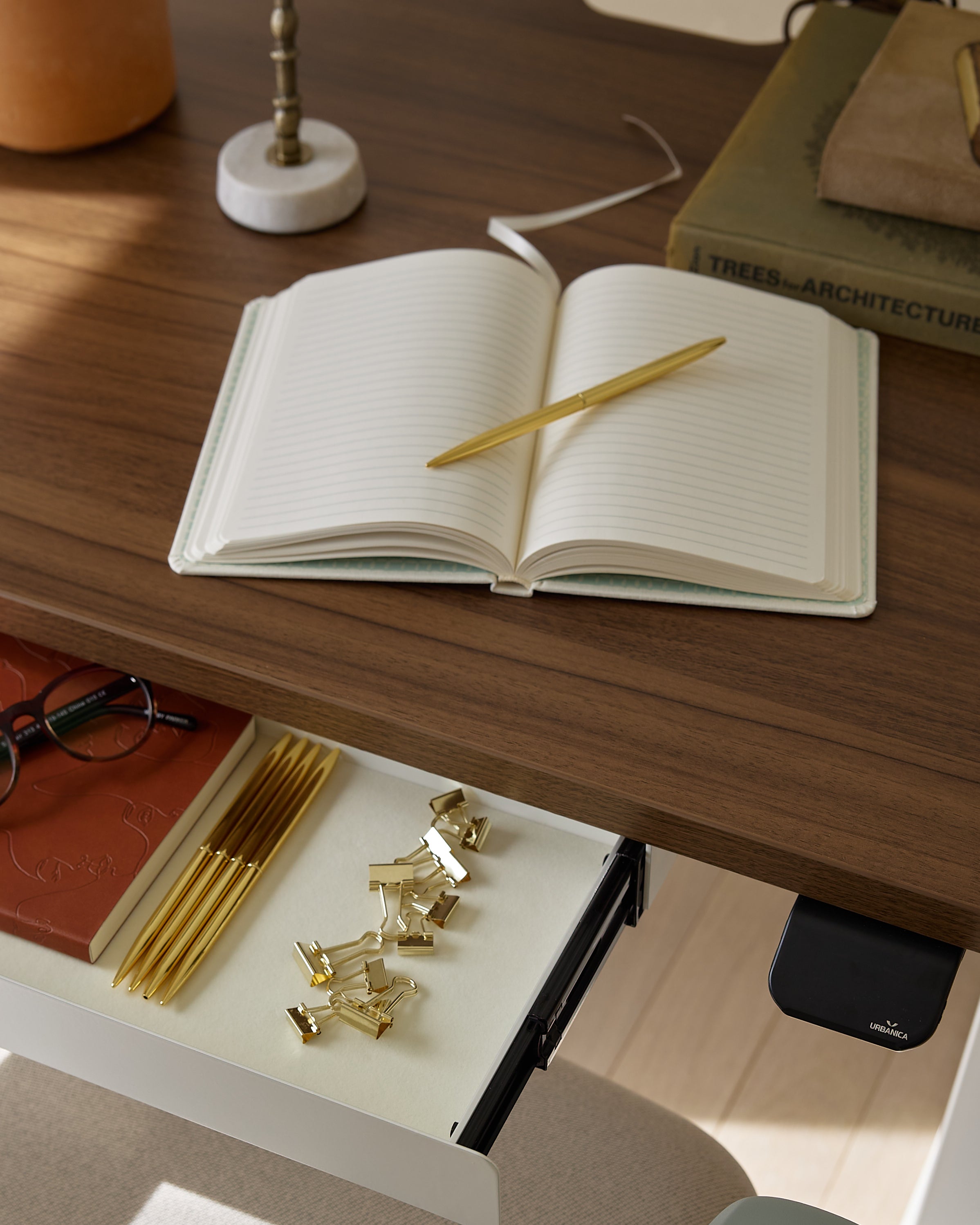Get 10% off your first order
Find the office furniture that’s designed to match your style, comfort, and needs perfectly. Subscribe
Standard Chair Height for Desk Setup Made Simple

Visit quiz page to see how we makes it easy to create an inspiring workplace


Creating a workspace that is both productive and comfortable requires consideration of far more than simply selecting the first stylish desk seen online. Many people make subtle mistakes that lead to clutter, discomfort, and wasted space. The good news is that the majority of these pitfalls are completely avoidable once you understand how design, size, and ergonomics work together.
A desk is the foundation of your daily routine, not merely a piece of furniture. Yet, it is easy to misjudge what is truly necessary. Poor measurements, ignoring comfort, or prioritizing style over substance can lead to years of frustration. Let's examine the most common mistakes—and how small changes can make your setup feel smarter, more efficient, and more spacious.
The three primary challenges in desk purchasing are: improper spatial assessment, ergonomic negligence, and overlooking functional details. Addressing these allows for a more efficient and health-conscious work environment.
These errors relate to incorrectly assessing the relationship between the desk's dimensions and the room's capacity and flow.
The Space Trap occurs when purchasers select a desk size in isolation, then attempt to impose it on their rooms after the selection has been made. This oversight results in obstructed corridors, drawers that collide with walls, and power lines winding their way across the floor.
Measure your room accurately before shopping.
Include door swings, window clearance, and electrical outlet placement in your planning.
Leave at least 3 feet of walking space behind chairs to ensure clear circulation.
A desk must enhance flow, not restrict it.

When Size Doesn’t Fit Function, the desk proves impractical. A desk that is too shallow leaves no room for proper arm rest and keyboard distance. Conversely, a desk that is too deep can become an unnecessary obstacle in the room.
Choosing balanced proportions keeps the workspace practical and visually clean.
|
Desk Use |
Recommended Depth |
Recommended Width |
Notes |
|
Laptop/Light Work |
55–65 cm (22–26 in) |
100–120 cm (39–47 in) |
Compact and minimal footprint |
|
Dual Monitor Setup |
70–80 cm (27–31 in) |
140–160 cm (55–63 in) |
Ensures arm comfort and proper screen distance |
|
Writing & Design Tasks |
75–85 cm (29–33 in) |
160 cm+ (63 in+) |
Allows layout space for physical materials |
These mistakes directly impact the user's well-being and the desk's long-term utility.
The Ergonomic Oversight means that if one experiences chronic discomfort in the shoulders or tingling in the wrists, the desk's sleek and contemporary style will not compensate. At no point should comfort take a secondary position to aesthetics. According to an ergonomic guide for desk setups by Princeton University Health Services, poor workstation configuration often leads to fatigue, repetitive strain, and long-term posture issues.
Keep your monitor positioned so the top edge aligns slightly below eye level.
Position your keyboard so that elbows maintain a 90-degree angle when typing.
Choose adjustable chairs and desks to allow for micro-adjustments that reduce chronic strain.
Working in one fixed position all day can contribute to back pain and sluggish energy. That is where an adjustable height option can completely transform comfort and workflow.
Desks that allow smooth sit-to-stand transitions encourage better posture, circulation, and movement throughout the day—making them a worthwhile long-term investment. If considering one, look into an ergonomically adjustable workspace that is sturdy and silent during adjustment.
The Hidden Clutter Culprit is poor cable management. When it comes to desk buying, power access and cable organization are among the most frequently overlooked issues. Without preparation, cords will dangle, create trip hazards, and make even a compact workstation appear disorganized.
Use built-in grommets or under-desk trays for hidden routing.
Choose desks with discreet rear openings designed to conceal power strips.
Keep devices close to outlets—avoid stretching cords across open floor areas.
These minor details make a major difference in maintaining a polished workspace.
These final pitfalls can lead to immediate buyer's remorse and a non-functional space.
When "More" Isn't Better, extra drawers and thick frames become a nuisance. This bulk reduces available legroom, makes the desk appear visually heavier, and limits options for chair positioning and movement.
A cleaner, lighter design with selective storage will keep your area open and airy. For example, a simple yet functional office setup can balance aesthetics with practicality without adding unnecessary bulk.
People make mistakes they later regret because they fail to physically examine how well a desk would truly fit their space. Visualizing Before You Buy is critical because real flow is rarely captured by the numbers on a specification sheet alone.
This low-tech trick helps prevent costly mismatches:
Mark the desk’s outline on your floor using painter’s tape.
Place your chair inside the outline and simulate the full range of movement (pulling in, pushing back, turning).
Adjust the layout until it feels natural—before you commit financially.

It is crucial to have a comprehensive understanding of how your body, space, and workflow interact before purchasing a desk. When these factors are in harmony, your working environment will naturally feel more productive and inviting. The goal is not to follow the latest trends; rather, it is to strike a balanced alignment between form, function, and comfort.
Those searching for an Office Table Wyoming will find thoughtful options that can be matched to both lifestyle and layout needs. Whether your space is compact or expansive, the key to a successful investment lies in smart planning and intentional design.

Standard Chair Height for Desk Setup Made Simple

Ergonomic Computer Stand Ideas for Better Alignment

Most Comfortable Inexpensive Office Chair Features
Get 10% off your first order
Find the office furniture that’s designed to match your style, comfort, and needs perfectly. Subscribe
Leave a comment